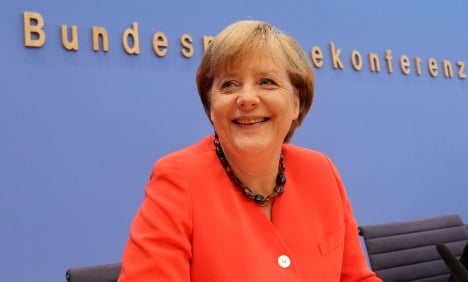Has Angela Merkel saved the euro?
That’s certainly how the German chancellor was presenting it after an emergency EU summit on Thursday forged yet another bailout package for heavily indebted Greece.
With the eurozone’s sovereign debt crisis festering for months, Merkel has faced a barrage of criticism both at home and abroad for failing to lead Europe out of its worst economic crisis since the single currency was introduced 12 years ago. But many German commentators were cautiously optimistic on Friday that she had perhaps finally decided to grasp the nettle.
The latest rescue deal greatly stretches the timeframe for Greece to repay its debt while lowering the interest rate Athens will have to pay. Crucially for Merkel, it also includes a €50-billion contribution from private creditors – something Berlin had long demanded.
And although it also inches the eurozone closer to the transfer union the Germans had long hoped to avoid, Merkel had clearly realized that sitting on the sidelines was simply no longer an option.
Throughout the crisis, the financial markets have in succession battered Greece, Ireland and Portugal – all troubled but relatively small eurozone economies. But in recent weeks, speculators began to circle Italy, which threatened to bring down the entire 17-nation currency union.
Merkel knows that, as an exporting nation few countries have benefited from the euro as much as Germany. But she has hesitated until now to simply pick up the tab for more profligate European countries. But such dithering did neither Greece nor Merkel any good.
Just days ago the chancellor was playing down Thursday’s crisis summit, warning against expecting a breakthrough. At the same time a poll showed her approval rating with German voters hitting its lowest point in five years.
The impact of Merkel’s disengagement throughout the euro crisis has been remarkable: No other major economy is doing as well as Germany right now, but her centre-right coalition is also extremely unpopular. It has not profited at all from surging growth and falling unemployment.
Instead, her failure to make tough decisions has seen her pilloried for supposedly putting domestic political concerns before key foreign policy issues. Her former mentor Chancellor Helmut Kohl reportedly even claimed Merkel was “ruining” Europe.
But now it seems clear to everyone inside the Chancellery that Merkel’s political fate and the euro have become inextricably intertwined.
In saving the euro, Merkel saves herself.
After months of criticism, she appears to have got the message – and passed it along.
Phillip Rösler, Merkel’s vice chancellor and economy minister, is reportedly cobbling together an incentive plan to encourage German companies to help the battered Greek economy. Is decisive action Berlin’s new modus operandi?
Only time will tell, of course. This government has repeatedly failed to meet the rather low expectations set for it. But for the eurozone the change couldn’t have come a moment too soon.
Marc Young



 Please whitelist us to continue reading.
Please whitelist us to continue reading.
Member comments